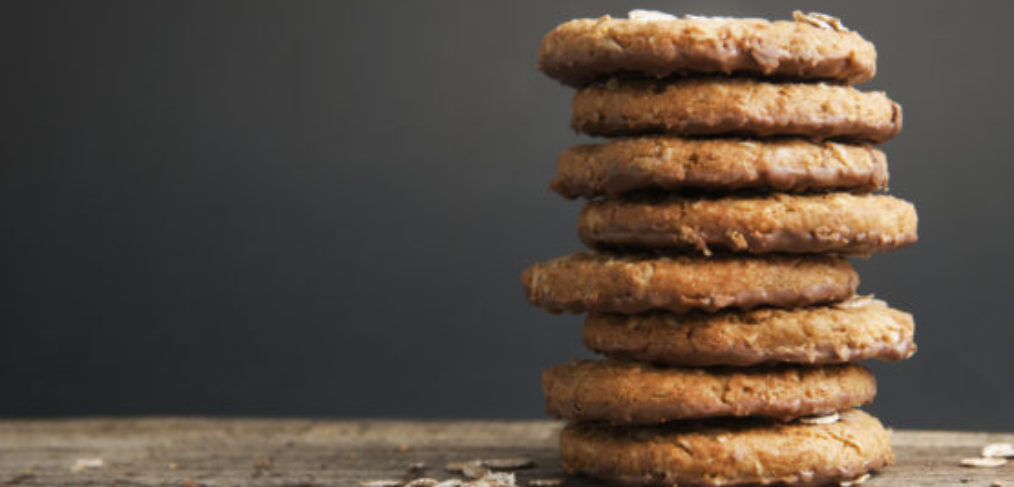Oatmeal Lactation Cookies: Helpful for Breastfeeding or Bad for Gut Health?

If you’re a breastfeeding mama…. or a mama who’s not breastfeeding, chances are you’ve heard of lactation cookies.
If you’re not, chances are they might sound like some sort of gimmick and admittedly, that is exactly what I thought they were the first time someone asked me about them, before I was pregnant myself.
Once I was pregnant, however, and in the midst of all the research we were doing in order to prepare, I noticed the topic of lactation cookies arose quite a bit, from other moms, from our lactation teacher, our doula and our midwife.
It was confirmed; lactation cookies are a thing, at least anecdotally.
I had to learn more about this concept. After all, I’d planned to breastfeed and given that I’d spoken with enough mamas who ate a clean, whole food diet who still reported having breastfeeding issues, I thought it was worth at least investigating.
So, what exactly is a lactation cookie?
Lactation cookies have been around for ages and most of the recipes on the social network include four ingredients, each of which is touted for its “milk-boosting properties”: oats, fenugreek, flaxseed meal, and Brewer’s yeast.
If 92% of first-time mothers encounter issues such as pain and trouble getting the baby to latch, with low milk supply is one of the most distressing concerns for new moms (1), there’s obviously a need for some missing piece.
But is the answer to be found in a cookie?
Let’s break it down.
Interestingly, when I began my search, I came up with health benefits of oats, first and foremost, the essential ingredient in these baked items and the very first thing that popped up with regard to why they’re helpful is the very reason why one might opt to avoid them when choosing to follow and anti inflammatory approach to eating.
In a word: saponins.
Those who are already familiar with an authentic Paleo approach, and / or an auto immune protocol will know that saponins are an anti nutrient, one which can increase permeability of the small intestinal mucosal cells, thereby inhibiting active nutrient transport, and facilitating the uptake of materials to which the gut would normally be impermeable as published in a Pub Med Study. (2)
Put another way: they’re a compound to be avoided, not just for those who already have an autoimmune dis ease, but anyone who wants to achieve or maintain optimal gut health.
On the flip side, the school of thought that backs the idea that oat-containing lactation cookies are beneficial, position saponins as being equally healthful and state that saponins are actually an immune-stimulating compound that may help increase levels of prolactin, a key hormone for milk production.
As for Fenugreek, flaxseed and Brewer’s yeast, collectively, they’d contribute phytoestrogens, omega 3s and B vitamins; depending on what else mom’s diet consists of, these may or may not be helpful additions.
And in terms of making them all into a cookie?
Other ingredients would factor into whether or not this would be an overall wise choice, as well as the frequency with which one might opt to eat them, and how they’re balancing the extra carbohydrate with their activity level.
Is there science behind the cookie concept?
I didn’t find any myself and when I checked with my mentor, Dr. Cordain, here’s what he said:
“When investigating human lactation and oatmeal or oats on both PUBMED and Google Scholar, I found absolutely nothing. The best bet is to eat healthy grass produced meats, free ranging eggs, fresh seafood and shellfish and fresh veggies, nuts and fruit.”
So are they a go… or a no-go?
If a new mama is active, not suffering from GI distress or AI dis ease and bakes a batch of whole-food based, no-funny-business additives, and has a cookie now and then… probably not such a big deal.
On the other hand, if commercially prepared, highly processed, high in sugar lactation cookies start showing up on multiple occasions throughout the day, they’re probably not such a great idea.
Not only would the mom’s diet begin to decline as well as her energy levels, mental focus, gut health, and her expected goal of losing some baby weight, her breast milk wouldn’t be nearly as supercharged if she were eating a real food diet.
Bottom line:
A cookie is a cookie is a cookie.
When optimizing for issue-free breastfeeding in order to produce premium milk, it’s simple: eat real food. Local, in season veggies, moderate amounts of mindfully sourced proteins and ample natural fats.
Don’t rely on cookies.
Granted, there are many factors that feed into baby nursing properly so this is certainly not to suggest that eating cookies (or not) is going to be a magic pill.
Rather, if the foundation of mom’s diet is real food, she’s at least ticking off one box in terms of how to create optimal milk as well as supporting her own, and subsequently, her baby’s gut biome.
There are so many resources at our fingertips and benefits of breastfeeding are many, so it’s well worth giving it a chance, even if the road does start out a bit on the bumpy side.
https://www.health.com/nutrition/lactation-cookies
http://www.ncbi.nlm.nih.gov/pubmed/3794833





